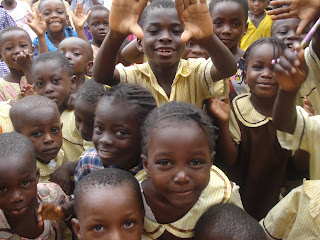Today we returned to the original government school, less than prepared for our bible quiz, but managed to get 22 interviews done within an hour, bringing my grand total to 145- not bad! After the interviews I took the time to find out a little more from the Headmistress about my research and the schools in general. The two government school are very close to Omega 94 and this is reflected in the data and it's trends, many of the children working, and approximately 50% of them doing so independently of their parents. I also noted that the students at the government school, in JH2 were a couple of years older than those in Omega's JH2 classes, averaging around 18, compared to 15/16. If they are going to complete their education (which most students say they would like to), the Omega school students will be old, but the government school students would have to remain in education well into their twenties, as Junior high has another year, and then there are three years of Senior secondary, and four years of University. The prospect of staying in school until university must therefore not work out well for the students economically, as it is unlikely that their parents will want to continue to support them, but attending school means foregoing the income they could obtain by working all day, and means further costs for school fees and materials, meaning that achieving a degree must be quite an achievement in many ways. I do feel however that the work that children do after school is done in good heart, as the students are generally aiming to help their parents, and are not doing it out of greed. The Headmistress refrained from asking me any religious questions, but I did find out that the children at the school have to buy their own books (if they can afford them- if not they go without?) a stark contrast to Ken's well resourced classrooms. I imagine that buying a number of these books would be expensive and out of reach of most of these children, particularly as most of them are likely to be required at the beginning of the school year- Ken's system of spreading the cost as 1 cedi per day is much more manageable for poor families surviving off low wages. The children are not provided with food or water either (bags are available at cost), where as Omega provides one hot meal and unlimited water for all of its children. The students also have to pay a PTA charge, and I don't doubt that the costs extend further than this, but the Headmistress was not willing to disclose any more. Interestingly though, the primary school, offering a shift-system due to over-subscription (regardless of the other government school next door), did offer a 'Food for Education' programme, which the Headmistress believed was a good incentive for children to attend school, and a good way of promoting good health.
 Following this, we headed to Big Milly's Backyard (on Kokrobite beach) for the weekend. We were served a lovely meal by the beach, which was followed by a cultural dancing and drumming show. There were some random acts, including fire-eating, glass eating, and other crazy things, but there was also some great dancing and music. The dancers (one in particular) however enjoyed some Obruni shaped audience participation, beginning with Tutu and I (individually of course), and returning to me for a second round later in the show, I am not sure I have the rhythm of an African but I feel I gave it a good shot!
Following this, we headed to Big Milly's Backyard (on Kokrobite beach) for the weekend. We were served a lovely meal by the beach, which was followed by a cultural dancing and drumming show. There were some random acts, including fire-eating, glass eating, and other crazy things, but there was also some great dancing and music. The dancers (one in particular) however enjoyed some Obruni shaped audience participation, beginning with Tutu and I (individually of course), and returning to me for a second round later in the show, I am not sure I have the rhythm of an African but I feel I gave it a good shot!















